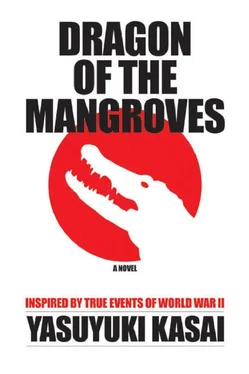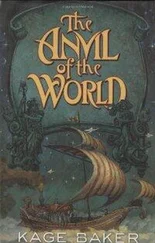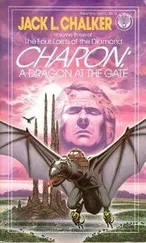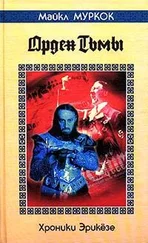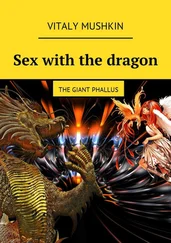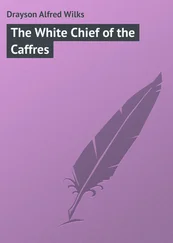Yoshitake was good at shooting a light machine gun, as well. His sturdy body enabled him to fire it from the hip. Assured of that, Sumi slung the Sten gun over his shoulder. Then he thrust the magazines into his haversack. The gun was far more dependable than his pistol.
“Thanks, Yoshitake. I will never use this lightly,” Sumi said. Then he drew a deep breath and stared at the faces of the soldiers standing in front of him, one by one. Though it had been a short time, he knew he had shared in troubles with all these men staring back at him.
“Well done, everybody! Now you are to go back to Taungup as instructed by Sergeant Shimizu. Be sure to take care of the injured.”
No one said anything. They had heard the argument, so each face portrayed a mixture of loneliness and uneasiness. Sumi couldn’t tell whether their concern was limited to their own fates, or if it gratefully included their commander. But he was satisfied enough. He thought they’d better worry only for their own safe return. Pondgi stood beside him with his rifle over his shoulder. Apparently this man was heading for the mountains immediately. Sumi was about to take a step toward the continuing adventure of his own.
Suddenly Shimizu ordered the troop to fall in. He probably realized he would never see Sumi again; this time, his expression was warm for the first time. “To Second Lieutenant Yoshihisa Sumi, our Second Platoon commander of Tankette Fifth Company, salute!”
When he returned the salute, Sumi felt an intensely stinging pain of parting welling up inside his heart.
Sumi and Pondgi came out of the mangroves at last and made it to a place that seemed like one of the dried-up rice paddies, southeast of Yanthitgyi, that they had passed the previous night. Sumi still heard the drone of enemy planes at times overhead, but he noticed the roars of cannons had died out. Likely, there was no position worthy to bomb anymore. He thought the systematized resistance of the garrison had drawn to an end.
But neither Sumi nor Pondgi had the courage to walk in the middle of open fields yet, even though the fighting waned. They made their way in forests of nipa palm and bamboo thickets, hemming the rice paddies carefully.
Before long, they spotted private houses and sheds among the paddies. Sumi could tell it was the settlement of Yanthitgyi, or maybe one of its outlying communities. He no longer had a map, but he had already carved the shape of Hill 604 in his memory the day before. Now in front of him, its ridgeline stood out unmistakably against the blue sky. He needed to cut through the paddies to approach the foot of it.
“Where are those Japan Masters walking around now?” Pondgi murmured.
Sumi answered, “Well, I don’t know, but it’s the way we’ve once passed. They may get to some neighborhoods of Ramree Town tonight if they’re lucky.”
The rescue party, now under Shimizu, had a long haul to cover nearly forty kilometers to bypass the town and get to Uga. But Shimizu was a trained NCO and able to cope with it. Sumi was confident that his men would be all right as long as he led the troop.
Sumi hid himself in a bamboo thicket and kept a watchful eye on each house in the settlement. He could see people living in some of them; locals might have taken advantage of this rare interval between the horrors of war. But overall, the area remained quiet. He took it as an opportunity to cross the open field, where he found a white pagoda standing at the edge of the settlement. It had a slope leading to Hill 604 behind it. Using it as a guidepost, he turned back to Pondgi.
His lungi suited Pondgi’s slick, dark skin well. It was natural as he was genu-ine Burmese. Sumi couldn’t take Pondgi along anymore. Everything from here was a Japanese problem.
“Pondgi.”
“Yes?”
“Now, listen to me. You’ve served our armed forces well. I appreciate it very much.”
“Not at all.”
“This island is full of Engli now. If they catch you and find you joining with Japan Masters, they may kill you.”
“I’m BNA. I knew that from the beginning.”
“We lost this war. We said we would chase the Engli off and make Burma independent, but we’ve lost badly. All we did make in the end was a mess. We can’t help the Burmese make a prosperous, independent country anymore. On second thought, I wonder if we really intended to do that from the first. If so, I have to apologize to you.”
Pondgi kept silent.
“All the Japanese Army will probably pull back from Arakan in a short time. Go back to Sandoway, your hometown, now. Don’t see any Japan Masters again.
Engli will come soon. Tell them Jap is your enemy, and that you’ve never worked among the Jap if they catch you.” Sumi took a deep breath and said, “I’m sorry to have driven you hard so many times. Forgive me.”
Pondgi said quietly, “No one can help it, because it’s a war. Buddha knows everything. We have a limit in our wisdom whether we are Engli, Japanese, or Burmese. We are repeating the same thing from a long time ago, so don’t worry about it.”
His nickname wasn’t for nothing. Sumi was surprised to hear this, and wondered whether a real Buddhist monk had his wisdom.
Pondgi had probably kept this insight and resignation to himself while acting with the Japanese Army. With compassion, he had long since forgiven those fussy intruders.
Sumi asked quietly, “Do you have a custom of parting gifts, Pondgi?”
“Tokens for journeys?”
“Yeah, exactly. I’m giving you the rifle you hold now. It’s a parting gift from me. No, it’s from the Imperial Army. Though it’s beaten up, a rifle is valuable in this country now. Protect yourself with it just in case.”
Pondgi rummaged his rucksack and presented him with a new white shirt, folded up neatly.
“Then I give you this.”
Compared with Sumi’s shirt, almost nearing a rag, its snow-white color was so bright that it dazzled him. He gave thanks and put it on promptly. Then he felt even his mind was cleaned and bleached, and remembered that most Japanese shrouds were white. White is the wear of dead, the wear of samurai ready to die.
“Don’t do hara-kiri, Master Sumi,” said Pondgi.
Sumi grinned a little. The time to part was now upon him.
“Of course, I won’t. Samurai never commit it so easily,” Sumi said, but he couldn’t explain to himself why he somehow took it as well as he did. “Good-bye, Pondgi. Look after yourself.”
Sumi bent forward and walked alone in a dry irrigation ditch under the sky dyed in deep blue, which was peculiar to the tropics. Fallow fields spread on both sides.
Twitters of wild birds surrounded him wherever he went. Dead grass over the fields offered the birds many good nesting sites. This country was originally rich with birds. They flourished, especially during the dry season when migrants flew to winter here. He stopped to listen for a while.
Grass sometimes rustled in the refreshing breeze. It mixed with the birdcalls to make a peaceful, rural tune. Then a whiz of a cannon abruptly reached his ears again, muting all other sounds. The war wasn’t over yet. An explosion came up from the northwest and shook his insides. The next one impacted on one of the ridges of Hill 604 and blew off many clods. An enemy mountain gun was firing there. Some friendly units were hiding themselves in the hill. He knew he must go right now.
He undid two buttons of the new white shirt to get more wind. Pondgi’s figure lingered in his mind, smiling gently. Sumi heartily wished for this boy’s safe return.
When Sumi opened his eyes, Pondgi’s face melted away into the blue sky, and Yukiko’s face appeared instead. She was also smiling. Flashing the same white teeth when he had choked on the soda pop, she was smiling sweetly. She would accept no matter what may happen with him from here. This was the kind of girl he had chosen.
Читать дальше
